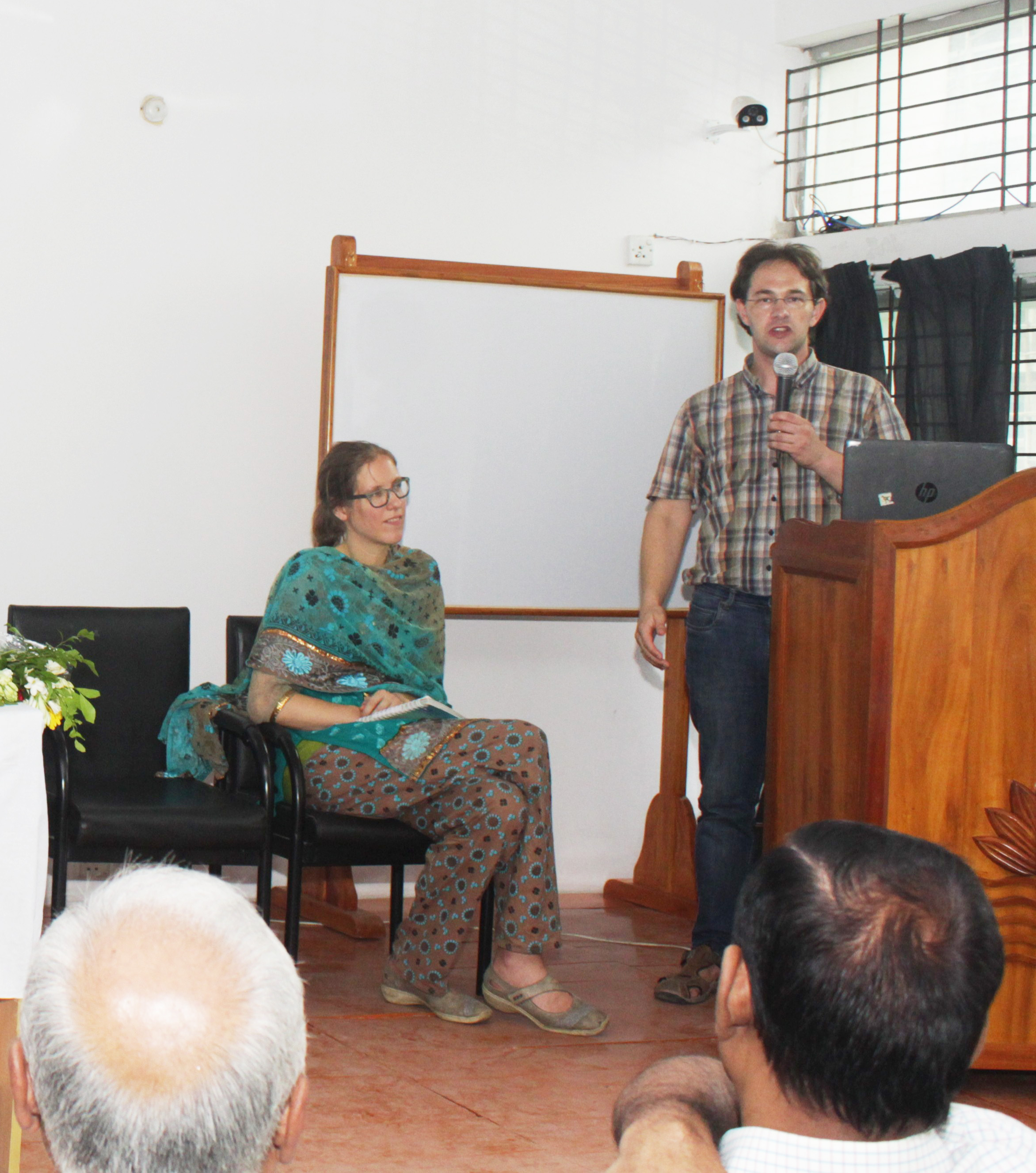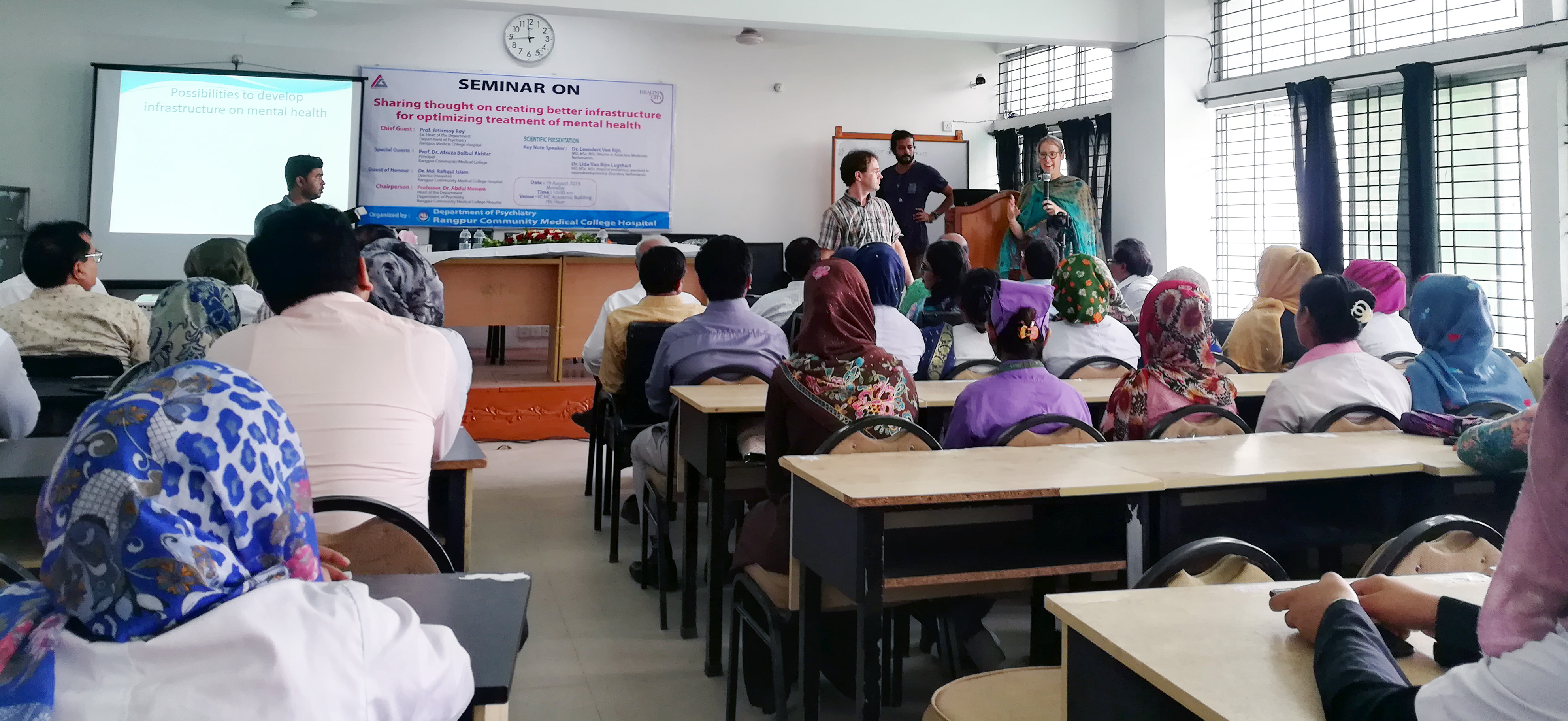20 Aug RCMCH organized a seminar on the topic of Mental Health Care in Rangpur Region
Seminar on: Sharing Thought on Creating Better Infrastructure for Optimizing Treatment of Mental Health

Organized by: Department of Psychiatry of Rangpur Community Medical College Hospital on 19th August 2019.
Keynote Speakers:
Dr. Leendert Van Rijn [MD, M. Sc., M. Sc. (Masters in Addiction Medicine), Netherlands] presented his speech on the topic of Creating Infrastructure for Optimizing Treatment of Mental Health and his study on the aspect of mental care facilities in Rangpur division which has done by the collaboration with RCMC.
Dr. Lida Van Rijn-Lugthart [MD, M. Sc., M. Sc. (Tropical Pediatric), Specialist in Neurodevelopmental Disorder, Netherlands] presented her speech on the comparisons of medication systems for mental health in between Netherlands and Bangladesh along with the social impact of addicted people’s mental health.
Guests who enlightened the seminar:
★ Chief Guest professor Jotirmoy Roy; Ex-Head of Department of Psychiatry of Rangpur Medical College Hospital
★ Special Guest Principal Prof. Dr. Afruza Bulbul Akhtar; Rangpur Community Medical College Hospital
★ Guest of honour Dr. Md. Rafiqul Islam; Director Hospital of Rangpur Community Medical College Hospital
★ Chair Person professor Dr. Abdul Monem; Head of Department of Psychiatry of Rangpur Community Medical College Hospital
Vice Principal Prof. Dr. M. M. A. Wadud Mostafa, Professor Dr. Shamsuzzaman, Asso. Prof. Dr. Motiur Rahman, Asso. Prof. Dr. Syed Mamunur Rahman, Prof. Dr. Md. Abdur Rahim, Asso. Prof. Dr. Shah Ahasanul Imran, Director Bir Muktijoddha Alhajj Mejor (Retd) Md. Nasim Uddin, Additional Director Hospital Md. Merazul Mohsin along All Professors, Lecturers, Intern Doctors and nurses were present in this significant seminar.
Mental illnesses are important but under-recognized public health problems in Bangladesh. Awareness about mental illness and acceptance of treatment are very low due to social stigma and superstition. Mental disorders affect hundreds of millions of people and constitute 5 of the 10 leading causes of disability worldwide, which if left untreated, creates an enormous toll on health and economy of the country. Despite the potential to successfully treat mental disorders, only a small fraction of those in need receive the most basic treatment. The WHO-supported National Mental Health Survey (2005) showed that 16.1% of the adult population (aged 18 years or older) of Bangladesh was suffering from some sort of mental disorder. Psychosocial care of mentally retarded and disaster-affected people constitutes a major challenge for the health and the social welfare systems of the country. The objective of this programme is to reduce the burden of mental disorders and to promote mental health.
Dr. Leendert Van Rijn & Dr. Lida Van Rijn-Lugthart both psychiatric from Netherlands are working to collect information on the mental health system in Rangpur Division, Bangladesh. The goal of collecting this information is to improve the mental health system and to provide a baseline for monitoring the change. This will enable Bangladesh to develop information-based mental health plans with clear base-line information and targets for every region distinctively. It will also be useful to monitor progress in implementing reform policies, providing community services and involving users, families and other stakeholders in mental health promotion, prevention, care and rehabilitation.

Bangladesh’s mental health policy, strategy and plan was approved in 2006 as a part of Policy, strategy and action plan for surveillance and prevention of Non-Communicable Diseases (NCD) and community-based activities in mental health is the main approach of the policy. A list of essential medicines is present in the country including antipsychotics, anxiolytics, antidepressants, mood stabilizers and antiepileptic drugs. The density of psychiatric beds in or around Dhaka, the largest city, is 5 times greater than the density of beds in the entire country. There is no consumer association in the country but there is 1 family association with 40 members. There are about 10 NGOs in the country involved in individual assistance activities in mental health. There are no legislative and financial provisions to protect and provide support for mental health service users in respect of employment and protection of rights. The mental health service for prisoners is insufficient.
Community based mental health facilities need to be strengthened through broadening the existing training of primary health care physicians and primary health workers. Strengthening of existing outpatient and inpatient psychiatric facilities in the general hospitals and creation of such facilities in private medical college hospitals and big general hospitals existing at the divisional and greater district level may be considered important steps for the development of community mental health services. Initiatives for the development of qualified and trained manpower are also urgently needed. Awareness and promotional campaign on mental health involving relevant sectors are also needed.

Sorry, the comment form is closed at this time.